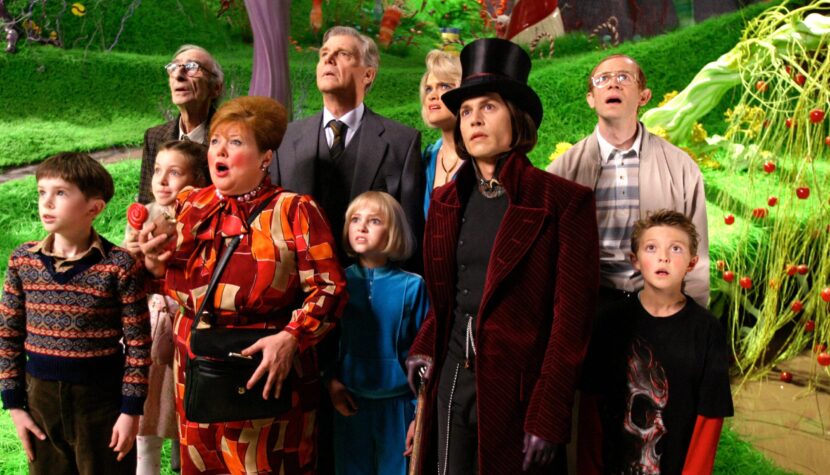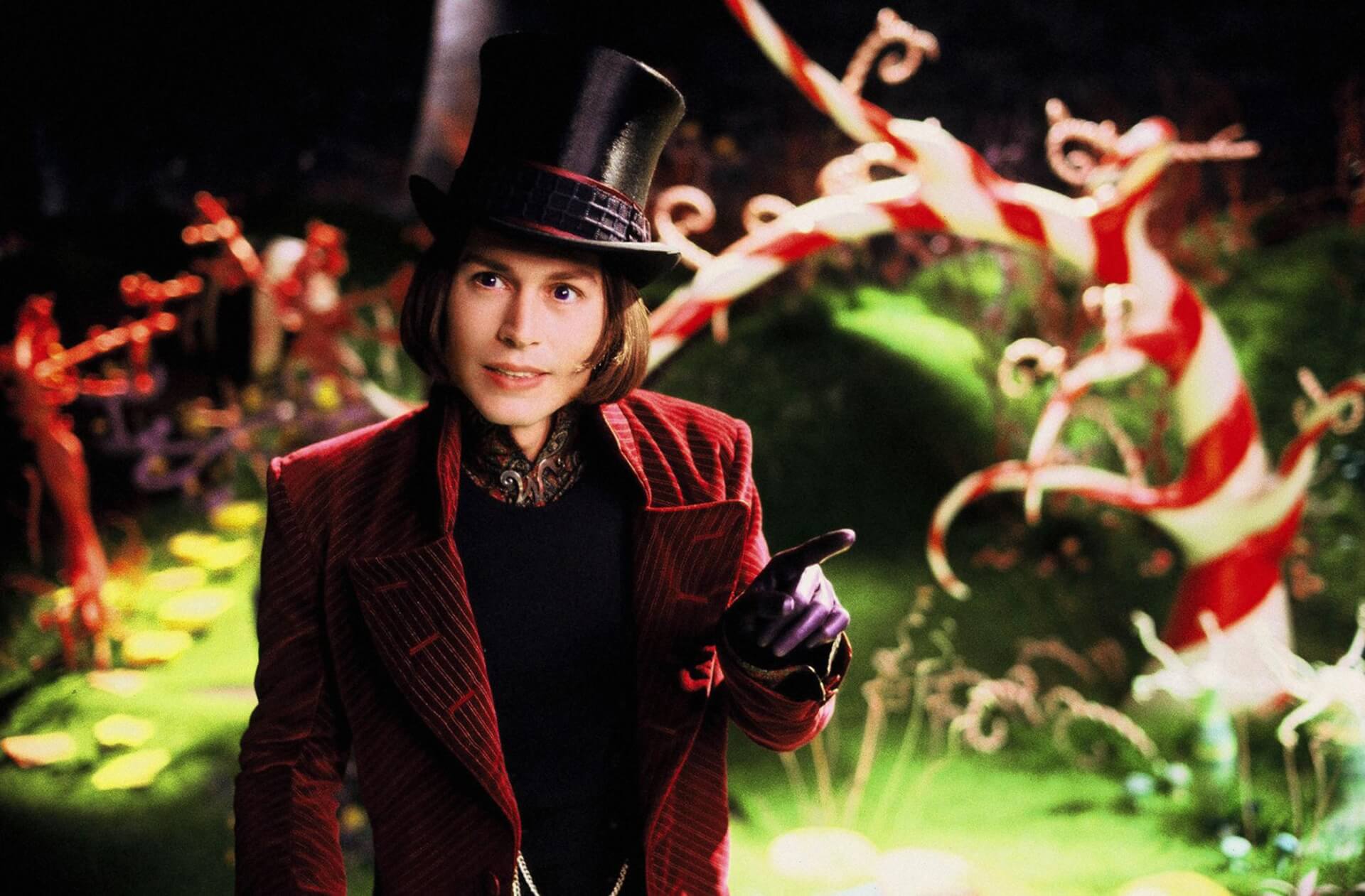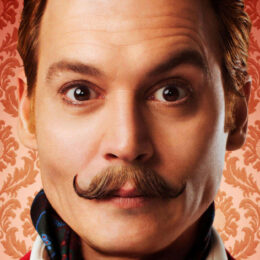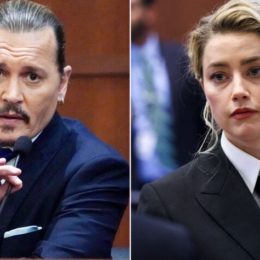CHARLIE AND THE CHOCOLATE FACTORY. Depp as Willy Wonka in Burton’s exceptional film

Charlie and the Chocolate Factory captivates and charms from the first to the last minute. Tim Burton, not for the first time, has proven that cinematic imagination combined with an appropriate budget can move mountains. Thus, a delightful and visually pleasing cinematic fairy tale has emerged. However, if that were the essence of this production, we would only receive something like a folk-art collage. Yet, folk-art collages no longer enchant many today.
Meanwhile, the magic of Charlie’s story lies elsewhere entirely. What is beautiful in Burton’s film is the juxtaposition of beauty and ugliness scattered here and there. That is everything that has nothing to do with fairy tales. It is the world of Willy Wonka’s childhood traumas and his disturbing extravagance. It is the chocolate factory filled with the surrealism of pure form. And finally, at the end of the enumeration, it is a critique of a society that so desperately wants to “have” that it has long been drowning under a heap of media garbage. Could it be that beneath the veneer of a family story, there is, in fact, a discreet protest film, and Burton has created another cunning cinematic manifesto of unrestrained imagination? That would be, you must admit, a prank of great significance.
However, the story itself, it seems, does not favor directorial pranks. Enter Charlie Bucket (Freddie Highmore) – a well-behaved boy with a good heart and a large family – living unassumingly on the outskirts of a big city. The Bucket clan may be suffering from hunger, but they give the impression of a warm and loving family. However, everything is about to change. Their joy will become the Happiest Child in the World – finding the Golden Ticket and touring Willy Wonka’s chocolate factory (Johnny Depp). The tour is intriguing because Willy Wonka, the candy market mogul, seems to employ no one in his factory. So, how is chocolate made? And why does Mr. Wonka invite Charlie and four other children? These questions will surely plague many minds. But everything will start to make sense when the gate to the mysterious factory finally opens…

“Luis Buñuel would be delighted” – that was the first thought that came to my mind when it became clear what Burton had really concocted here. The same Buñuel, the father of cinematic surrealism, who, in The Golden Age, treated the audience to a cow lounging nonchalantly on a lady’s bedroom bed. In Buñuel’s world, neither the cow nor even a bishop being thrown out of a window with feathers and a complete wardrobe caused any surprise. The foundation of that cinema was the carefree juxtaposition of distant dreamlike associations. Today, Burton acts just as cheekily.
Pink sheep don’t scare him, a girl turning into a blueberry doesn’t scare him, not even mockery of Stanley Kubrick’s 2001: A Space Odyssey scares him. A series of absurd associations, an unordered collection of cultural references, chaos of colors and content – all of this is present here and beautifully, masterfully depicted by Burton. Furthermore, the shadows of Willy Wonka’s personality, who has little in common with the smiling Mr. Blikle, lend the whole a somewhat demonic charm. And all the fascinations, fears, and obsessions of the somewhat childish, somewhat eccentric Wonka have their roots in childhood. That exaggeration of the world, that magnification of reality, and that childish fear stand behind both the alienation and the genius of the character played by Depp. Freedom of imagination and the ability to freely shape space become the hero’s only and best outlet for all fears and emotions. This was what surrealism advocated, and this became the fate of Buñuel’s work. Freedom of thought and freedom to dream! Even if that dream, strange, incomprehensible, foolish, and preferably immoral, was…
Related:
However, this is not the only surprise of Burton’s new film. Charlie and the Chocolate Factory is not just a manifesto of free imagination, but also a critique of a society heading towards easy success and constant consumption. Burton sketches the characters of spoiled children and their spoiled parents – and again, he mocks, points fingers, or exaggerates. If he could, he would probably add a mustache to one of his heroines – the girl with the blond ponytail in a pressed sweater from Harrods. Moreover, like all negative characters in Burton’s films, that girl gets a lesson – she ends up in a chute full of rotting waste. The film has a fairy tale structure, and in a fairy tale, justice must be served. Burton, slow but just, mainly rewards individuality and non-conformity to life in a consumer society. Attempts to conform to the established personal patterns promoted by contemporary culture, as well as the earnest efforts to secure a place at the forefront of the rat race, are harshly punished in Charlie’s world. Otherness and distinctiveness prevail. On one side, a boy with a big heart triumphs, on the other side, victory is also claimed by the eccentric Willy Wonka, who would be destined for failure in a sensible reality. What unites them is the selflessness of their actions and the sincerity of their intentions. With this message, Tim Burton releases us from the cinema. And indeed, the world seems somewhat nicer for the first few minutes after watching Charlie…
However, what is most surprising and what makes Burton’s production so exceptional seems to be the combination of a dream manifesto and bold criticism of a success-oriented society with all the glitz and glamour typical of Hollywood production. Despite the layers of extravagance, Charlie and the Chocolate Factory remains, in its form, a pleasant, American, and very family-oriented story. A fantastically executed story, dynamically presented, full of warmth and humor. Everything here seems to be filtered through Burton’s cinematic imagination. Everything, not just the chocolate factory but also the deteriorating, poor home of the Bucket family. Johnny Depp, amidst all this chaos, finds not his first or last role, but one for which he seems to be not only the best but the only candidate. Freddie Highmore, known from Finding Neverland (Charlie), shines just as brightly on screen despite his young age. The only question is whether he will remain the eternal “golden child” or whether he will linger longer in the dream factory?
And finally, a reflection of the light, easy, and enjoyable kind. In 2005, there were many bold films that sparked discussions. However, on none of them did I have as much fun and carefree enjoyment as on Charlie and the Chocolate Factory. In the realm of entertainment cinema, which doesn’t necessarily have to be vacuous cinema, Tim Burton had no competition in that season.



